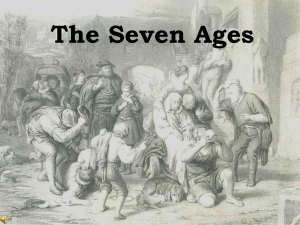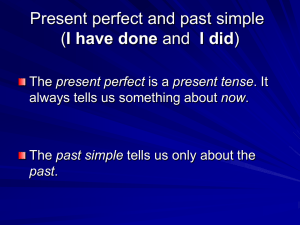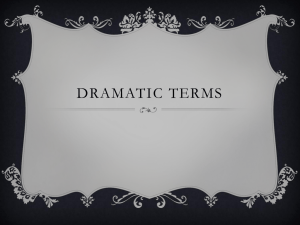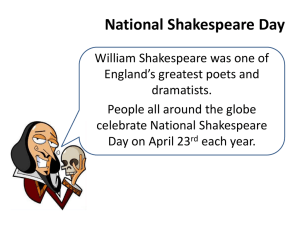William Shakespeare
advertisement
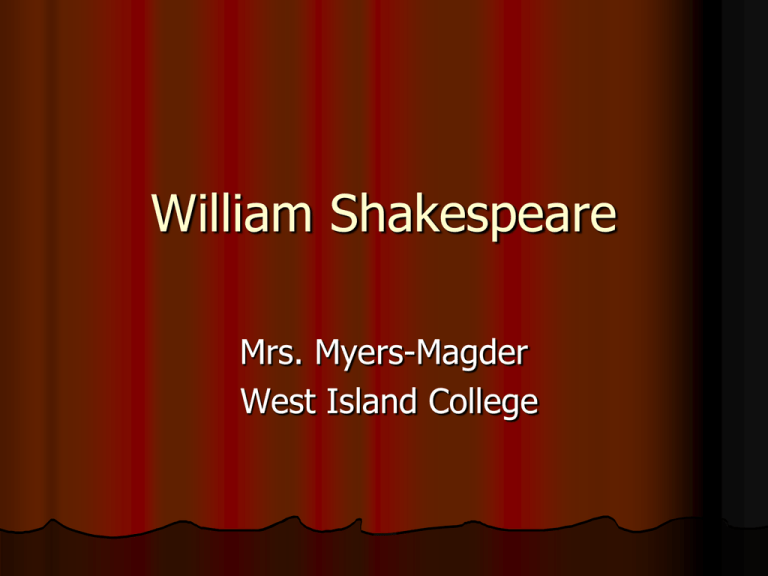
William Shakespeare Mrs. Myers-Magder West Island College William Shakespeare (1564-1616) is the most famous writer the world has ever known. But he started out just like any other 16th Century kid. Shakespeare was born in an English town called Stratford-upon-Avon. He was the third child of eight born to John, a glove maker, and Mary Shakespeare. At 18, Shakespeare married Anne Hathaway, an older woman. By the time he was 22, they had three kids, including twins. They named their first daughter Susanna, and the twins, Hamnet and Judith. Did Shakespeare write about his life in his plays? Anne was eight years older than her new husband William. We can only wonder if Shakespeare was speaking for himself in A Midsummer Night's Dream: Lysander: The course of true love never did run smooth; But either it was different in blood... Or else misgraffed in respect of years-Hermia: O spite! too old to be engage'd to young. At 23, he moved to London and joined an acting company. A few years later, his first plays were performed and became big hits. In all Shakespeare wrote 37 plays – including Hamlet, Romeo and Juliet, and A Midsummer Night’s Dream. The Works. Shakespeare's early works, to mid1594, can be divided into four groups: 1. 2. 3. 4. The Classical plays: his first works which were heavily influenced by the classical examples he had learned as a student. (The Comedy of Errors, Titus Andronicus). The History plays: where Shakespeare took the rough materials he found in certain early chronicle plays, and virtually invented a new genre called the history play. (Henry VI plays, Richard III. The Narrative Poems and Sonnets: his favorite author Ovid served as the model for Venus and Adonis and the Rape of Lucrece. It is also extremely probable the sonnet sequence (spurred by Sidney's Astrophil and Stella in 1591) was begun (perhaps on commission) to encourage the Earl of Southampton to marry. The sonnets were probably composed over a number of years, but were probably completed by 1597. Experiments in comedy: The Taming of the Shrew, based on Italian comedy, Two Gentlemen of Verona, an experiment with plot and character, and the more mature Love's Labour's Lost, probably all belong to this period. The years 1594-1599 were momentous for Shakespeare. He produced a steady stream of plays, and he continued to be the principal actor and manager in the Chamberlain's men, an acting company. The Globe Theatre was the place to be in Elizabethan London. Shakespeare’s plays were performed in this venue. Ms. Myers at the Globe Theatre in London, England. Shakespeare’s later works included tragedies and comedies, and sonnets – a form of poetry. Shakespeare who? Although Shakespeare’s works are now considered masterpieces, people didn’t think of them that way in the Elizabethan Era. Shakespeare’s biggest fans might not have even known his name – just as people today often don’t know who writes their favourite TV shows. Scholastic Scope-February 26, 1993 Why is Shakespeare famous? With the 154 poems and 37 plays written during Shakespeare's literary career, his body of works are among the most quoted in literature. Shakespeare created comedies, histories, tragedies, and poetry. Shakespeare's works have been translated into every major living language, and his plays are continually performed all around the world. For over 400 years, his work has been performed, read and analyzed by millions. Classiclit.com Wikipedia.com You are quoting Shakespeare if: you have ever refused "to budge an inch" or suffered from "green-eyed jealousy” you have been "tongue-tied" - or "in a pickle" you have insisted on "fair play" - "slept not one wink" you "laughed yourself into stitches", had "too much of a good thing", or if you have "seen better days" You are quoting Shakespeare if: You have ever referred to your "own flesh and blood", or if you "lie low" You act "without rhyme or reason", or if you bid me "good riddance" and "send me packing", if you wish I was "dead as a doornail", if you think I am an "eyesore" - a "laughing stock" or a "blinking idiot", then... "For goodness sake" you are quoting Shakespeare! Elizabethan Era in brief The Elizabethan Era is the period associated with the reign of Queen Elizabeth I (1558–1603). It saw the flowering of English literature and poetry. This was also the time during which Elizabethan theatre grew and William Shakespeare, among others, composed plays that broke away from England's past style of plays. Wikipedia.com A Midsummer Night’s Dream Points of interest "A Midsummer Night's Dream" inspired four hundred years of stories and pictures of tiny, butterfly-winged people living in the woods. Walt Disney's fairies are their descendants. A Midsummer Night’s Dream Points of interest The popular movie "Dead Poets Society" used the play as a metaphor for young people choosing nonconformity. A Midsummer Night’s Dream Points of interest The best-known character, "Bottom", is transformed into an "ass" and becomes the "butt" of jokes. The play-within-a-play looks like Shakespeare's parody of his own "Romeo and Juliet". A Midsummer Night’s Dream Points of interest It is not known exactly when A Midsummer Night's Dream was written or first performed, but it is assumed to be between 1594 and 1596. Some have theorized that the play might have been written for an aristocratic wedding; numerous such weddings took place in 1596, while others suggest it was written for the Queen to celebrate the feast day of St. John, but no concrete evidence exists to link the play with either of them. In either case, it would also have been performed at The Theatre, and, later, The Globe in London. Wikipedia.com Enjoy one of Shakespeare’s finest comedies!




